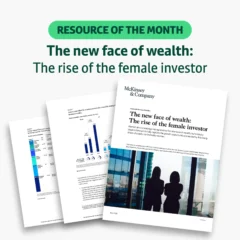
As South Africa’s oldest bank, First National Bank (FNB) serves 8.6 million retail and commercial customers in the country and across the continent, with operations in Namibia, Botswana, Lesotho, Swaziland, Zambia, Mozambique and Ghana.
This month, we spoke Nicole Sykes, head of Women in Business, about the elements behind the bank’s strong footprint with women entrepreneurs.
Alliance: For the benefit of our global readership, can you please share FNB’s market position and business model?
Nicole Sykes (NS): First National Bank (FNB) is the oldest bank in South Africa, founded 186 years ago. With 8.6 million retail and commercial customers across the broader African continent, FNB continues to grow its franchise in both existing and new markets. Growth starts with a compelling customer offering that provides a broad range of innovative financial products and services across its transactional, lending, insurance and investment businesses.
Alliance: Focusing on the Female Economy in particular, what is FNB’s history in supporting Women’s Markets and what segments are you focused on in particular?
NS: FNB has a strong history of supporting women’s markets, emphasing economic empowerment through various initiatives. The bank has committed significant resources, including a significant investment aimed at low- and moderate-income communities, promoting access to credit and access to markets and networks for women.
FNB focuses on female entrepreneurs, with 33% of our commercial base being led by women. We also provide tailored financial products that suit the needs of our customers and mentorship programs to enhance women’s participation in the economy.
Our efforts have garnered global recognition, highlighting our commitment to fostering female entrepreneurship. Many of our women are predominantly in the retail, services and social sectors, but we are seeing a growing number in technology, manufacturing and construction.
Alliance: What are the main elements of your value proposition for women in business?
NS: Our value proposition is centered around providing our female entrepreneurs with access to markets, networks, and education to help them grow and scale their businesses. We add value to our female entrepreneurs through our networking events and profiling opportunities, through our various digital and online platforms. We also provide new access to market opportunities by having a Women in Business badge on their online profile as part of our nav» Marketplace offering which is a digital marketplace for our clients to gain access to services offered by FNB Banked businesses.
We provide the right assistance and support at the right stage of their business growth. Furthermore, we leverage off our extensive product range and solutions to support our women business owners in all facets of their business and personal lives – from loans to insurance, fiduciary services, and personal accounts.
Alliance: What do you consider the most pressing challenges remaining of your Women’s Markets Program and why?
NS: Given that we have a large base of female-led businesses, it often becomes challenging to reach all of them at the same time. However, we continue to work closely with them through our relationship managers and through initiatives aimed at supporting the women entrepreneurs.
Access to data is also an ongoing challenge—we can only do what we can with the information we are provided. If we do not have adequate information on the businesses that submit documentation, it becomes challenging to provide them with tailored products and solutions.
Alliance: What role does/will digital financial services play in your financial inclusion strategy, and including women in particular?
NS: Digital financial services are central to FNB’s financial inclusion strategy, particularly for women. By providing accessible platforms like mobile banking and online services, FNB enhances convenience and security for users, allowing them to manage finances anytime and anywhere.
Specific initiatives include tailored products for female entrepreneurs and features that facilitate easy transactions, savings, and credit access. FNB’s commitment to user-friendly digital experiences has garnered recognition as South Africa’s Best Digital Bank, emphasizing the importance of ease of use in fostering financial inclusion.
Alliance: While capturing sex-disaggregated data is critical to establishing a baseline for a women’s markets program, many banks have significant challenges due to legacy systems etc. Where are you in your gender data journey?
NS: It has been an interesting journey for us since we started working on this initiative seven years ago.
We noticed the need to support female-led businesses in our economy as they added a lot of value as a growing “niche”. However, at the time, we had no indicators to analyze the data by gender. As a result, we began by identifying our female clients via ID numbers, as well as the shareholding information we had. Since then, we have been through multiple iterations of refining that data set, and as it matures, we are able to interrogate and continuously enhance it.
Alliance: As climate action is at the top of banks’ agendas, how is/will the bank support customers to adapt and mitigate climate change?
We support various initiatives that help drive reduced carbon emissions, improved water security and effective waste management, like:
- EcoEnergy home loan – we provide an interest rate concession to EDGE-certified developments to lower the cost of finance for customers.
- Green solutions – we provide credit to our commercial clients to purchase green solutions.
- Strategic partnerships – we provide access to reputable emissions and water reduction products and services on the eBucks shop and nav» Marketplace.
- Sustainable finance – we provide green funding to address energy costs, certainty, and emissions reduction.
Why did you decide to join the Alliance and what are you looking forward to learning from and/or sharing with the network?
We are privileged to have been introduced to the Financial Alliance for Women and are confident that through learning and collaboration we can enhance our offering, and ultimately serve our clients better.



